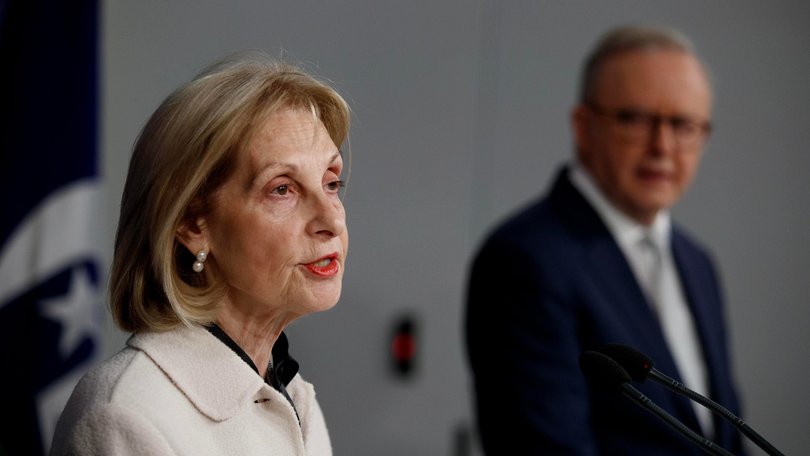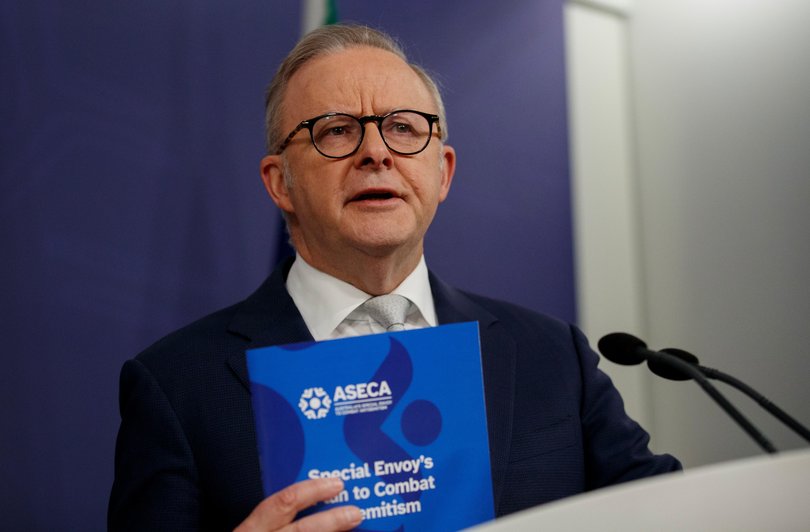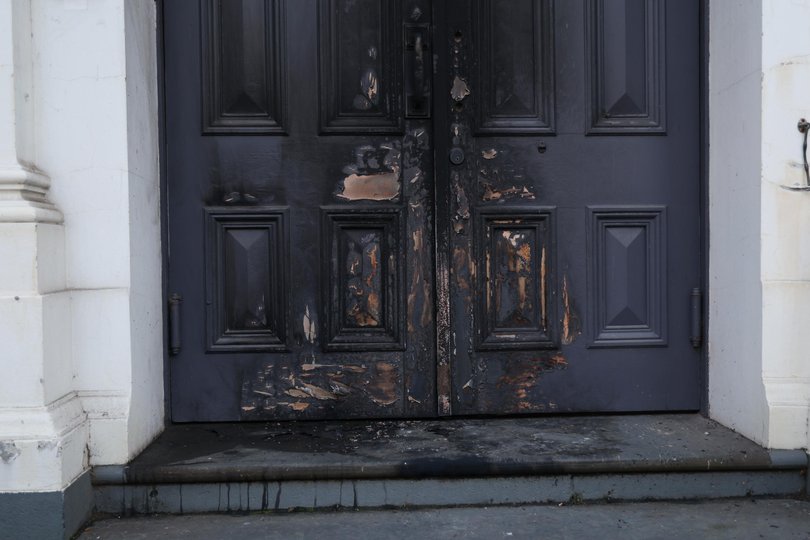Plan to combat anti-Semitism: Universities may be put on notice and could lose funding
Unis await the Government’s response after a landmark plan to combat anti-Semitism put them on notice and called for Federal funding to be withheld or stripped if they fail to adequately stamp out the hatred.

Universities have been warned funding arrangements are “not a blank cheque”, after a landmark plan to combat anti-Semitism called for Government support to be withheld or stripped from the institutions if they fail to adequately stamp out the hatred.
Under Special Envoy Jillian Segal’s plan to combat anti-Semitism, universities must be accountable for addressing the scourge, adopt and integrate an effective definition of the hatred, and “embrace cultural change to end their tolerance for anti-Semitic conduct”.
Since October 7 2023, universities have been the site of large pro-Palestine protests, including encampments, and Jewish students have reported being attacked and vilified.
Sign up to The Nightly's newsletters.
Get the first look at the digital newspaper, curated daily stories and breaking headlines delivered to your inbox.
By continuing you agree to our Terms and Privacy Policy.Labor MP Josh Burns, who chaired a parliamentary inquiry into universities and anti-Semitism, said the Government provided “a lot of funding to universities” and while he hoped it wouldn’t reach the stage where funding was cut, “It is not a blank cheque”.
Ms Segal said she will develop and launch a “university report card”, which would assess each university’s implementation of “effective practices and standards”, including complaints systems and campus safety.
She said that if significant problems remain at universities by the start of the 2026 academic year, a dedicated judicial inquiry should be established.
Her report recommends that as a last resort, the Government withhold funding from universities that do not tackle anti-Semitism.
“The envoy will work with government to enable government funding to be withheld, where possible, from universities, programs or individuals within universities that facilitate, enable or fail to act against antisemitism,” it reads.
“While freedom of expression, particularly artistic expression, is vital to cultural richness and should be protected, funding provided by Australian taxpayers should not be used to promote division or spread false/distorted narratives.”
She also wants public grants to university centres, academics or researchers to be subject to termination if the recipient engages in anti-Semitic or other hateful speech or actions.
Universities Australia chief executive Luke Sheehy said the peak body had been “working constructively” with Ms Segal, and would engage with its members as it considers recommendations.
“Academic freedom and freedom of expression are core to the university mission, but they must be exercised with responsibility and never as a cover for hate or harassment,” he said.
“We look forward to further detail on the government’s response.”
Mr Burns said during the parliamentary inquiry he had found universities who “took this seriously and were willing to engage and willing to look at their processes to make sure any incident or complaint was taken seriously, they did a pretty good job”.
“Where we got a huge gap in adequate responses to instances of anti-Semitism were when institutions in leadership did not engage, dismissed these concerns and did not take them seriously,” he said.
Ms Segals’s 49-step plan, with some proposals already in place, would share responsibility for stamping out anti-Semitism between Federal and State Governments, universities and cultural institutions, and her own office.
She said she would be monitoring media organisations to ensure “impartial and balanced” reporting, pushing governments to accept a controversial definition of anti-Semitism and embed Holocaust and anti-Semitism education in school curricula, and strongly urging visa applicants continue to be screened for anti-Semitic views or affiliations.
Ms Segal’s report, which she began working on last July, found a 300 per cent spike in anti-Semitic incidents since October 7. The most recent was an alleged arson attack on a Melbourne synagogue last Friday while worshippers — including children — were inside.
Prime Minister Anthony Albanese said he wanted to push anti-Semitism “to the fringes of extremism” if not “disappear altogether”, but did not commit to the raft of policies — saying his Government would “carefully consider” the recommendations.

“There is a number of things in here that we are doing. There’s a number of things that can be implemented quickly. There are a number of things that will require work over a period of time,” he said, standing next to Ms Segal.
Ms Segal’s report found anti-Semitism in Australia had risen to “troubling levels” in the mainstream, which had been “driven by conflict in the Middle East, manipulated narratives in the legacy media and social media, and the spread of extremist ideologies”.
The report also recommends terms be included in all public funding agreements with cultural institutions or festivals to “allow for the efficient termination of funding where the institution or festival promotes, facilitates, or does not deal effectively with hate or anti-Semitism”.
Home Affairs and Arts Minister Tony Burke said these are issues already taken into consideration by Creative Australia, the Government’s arts investment body.
“There are different principles that are expected in cultural policy, that already go to some of this,” he said.
In another recommendation, Ms Segal called for Holocaust and anti-Semitism education to be included in the national school curriculum.
Her report found there was a clear divide in views between Australians aged under and over 35, which she attributed to “generational differences in media consumption and the perceptions younger Australians’ have of the Middle East and the Jewish community”.
“These differences in attitude to Jewish Australians and to the existence of the State of Israel have informed many of the elements in this Plan,” she wrote.
Ms Segal proposed to establish a project that would support “trusted voices to publicly refute anti-Semitic views, particularly via social media platforms”.
Mr Albanese said social media had pushed “people towards extremes”.
“Australians want a country that is in the centre. That has different views that we debate respectfully, and have dialogue respectfully,” he said.
Ms Segal’s report also stated her office would monitor media organisations to “encourage accurate, fair and responsible reporting” and push them to meet editorial standards and commitment to impartiality and balance “and to avoid accepting false or distorted narratives”.

It also said the envoy’s office would work with governments to have publicly funded broadcasters “accurately and positively represent Jewish history and culture”, and engage directly with those broadcasters to “encourage them to develop programs that add to social cohesion”.
The Executive Council of Australian Jewry, which put a 15-point plan to combat anti-Semitism the Government in February, welcomed Ms Segal’s “comprehensive action plan”.
“This is a very well-considered plan which aligns completely with the ECAJ’s thinking and the Jewish community’s expectations. It is evident that much research and thought has gone into this document over many months. Its release could not be more timely, given the recent appalling events in Melbourne. The actions which the plan call for are now urgently needed,” president Daniel Aghion said.
“We call upon all sectors of society, including government, law enforcement, the media, the university sector, education authorities and online platform providers to co-operate with the Special Envoy and the Jewish community to give this action plan full force and effect.
“We thank the Prime Minister and Minister for Home Affairs for standing with the Jewish community at this time and look forward to working with the government to help make antisemitism a thing of the past.”
The report recommends Australian governments require all public institutions to adopt the International Holocaust Remembrance Association’s definition of anti-Semitism. While the definition has been embraced by some, there are critics who argue it conflates genuine criticism of Israel with anti-Semitism and stifles free speech.
Mr Albanese on Thursday said there was space for legitimate criticism of Israel, as there was for the Palestinian Authority, but that debate needs to be respectful.
The Jewish Council of Australia warned Ms Segal’s plan risked “undermining Australia’s democratic freedoms, inflaming community divisions, and entrenching selective approaches to racism”.
It said it was especially concerned about the recommendation to endorse the “widely discredited” IHRA anti-Semitism definition, which it said “has been used to silence legitimate criticism of Israel and Zionism”.
“This document reads more like a blueprint for silencing dissent rather than a strategy to build inclusion. The report’s vague language around ‘antisemitic narratives’ or ‘affiliations’ , coupled with its emphasis on the discredited IHRA definition of antisemitism, make the actions recommended dangerously unclear,” executive officer Max Keiser said.
The PM said he hoped the report was not politicised or made partisan.
The Coalition welcomed the report, but said it was deeply disappointed at the Government’s “lack of leadership” and that the Prime Minister had not given immediate clarity about what he planned to do with the report.
Opposition Leader Sussan Ley said the report was critical but “it should not fall to one individual to shoulder this fight against hate”.
“This report shows antisemitism is not just a problem of security or law enforcement. It’s a cultural and societal cancer that needs attention through our schools, universities, media, and even the arts,” she said.
Shadow attorney-general Julian Leeser said the Prime Minister needed to give a commitment to “action her policies”.
“The Jewish community is telling us that Australia now leads the world in fire-bombings and other violent attacks on Jews. In such an environment we want to see the prime minister leading the fight on anti-Semitism and being accountable for the outcome. It’s time his actions matched his words,” he said.

